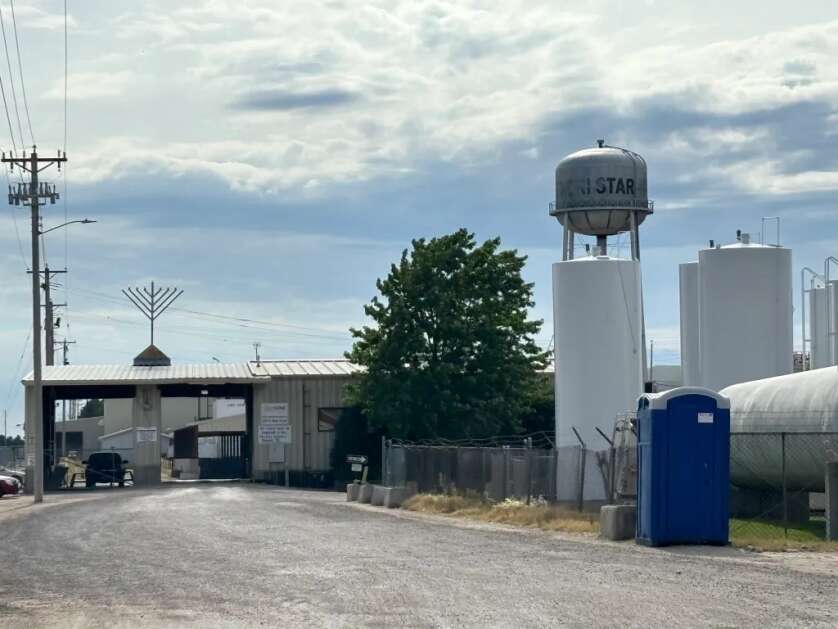The Gazette uses Instaread to provide audio versions of its articles. Some words might not be spoken correctly.
A motion to intervene in a lawsuit filed by the state against a Postville meatpacking company for persistent wastewater pollution violations has been filed by an environmental organization that promotes clean water in northeast Iowa.
To ensure that the facts of Agri Star’s violations can be fully considered and that the violations can be fully presented in court, the Driftless Water Defenders filed a motion on August 12 to join the Iowa Department of Natural Resources’ case against Agri Star Meat & Poultry as a third party.
This follows Driftless Water Defenders’ February federal complaint against the Postville plant, which sought fines and permit compliance for the pollution released into Allamakee County’s Hecker Creek.
In December 2024, the group first announced that it intended to sue the meatpacking facility for wastewater violations related to excessive ammonia, copper, chloride, and other contaminants.
“I was involved in two lawsuits filed in the early 2000s against the same facility over the same violations,” said Steve Veysey, a retired chemist from Iowa State University who is on the nonprofit’s board of advisers.
Veysey called it a travesty. We are currently engaged in the same conflict as we were nearly two decades ago.
Disappointing and inadequate
The group’s request was made less than a month after the office of Iowa Attorney General Brenna Bird declared that it had negotiated a settlement with Agri Star on the DNR case.
On July 18, the same day the case was filed, the consent decree—a settlement between two parties—was submitted to Iowa Courts Online.
The settlement decree stipulates that Agri Star must fully comply with its National Pollutant Discharge Elimination System (NPDES) permit by December 31, 2026, and pay $50,000 in penalty fees.
Driftless Water Defenders contends in their application to intervene that the fine is insufficient in light of the company’s infractions.
The Consent Decree only imposes a $50,000 fine, which is less than the penalty for a single day violation under the federal (Clean Water Act), despite the severe and repeated violations that span several years and are detailed in the Petition. The Driftless Water Defenders move to intervene states.
Jim Larew of Iowa City, the attorney for Driftless Water Defenders, claims that the group’s participation is an opposition to the settlement.
In order to grant its motion to intervene, to review its entry of the Consent Decree, and to give (Driftless Water Defenders) the chance to object to the terms and conditions of the Consent Decree, the Court is kindly asked to enter the necessary orders.
According to Michael Schmidt, the Iowa Environmental Council’s staff attorney, the Attorney General’s Office settlement was insufficient and extremely unsatisfactory in terms of the Clean Water Act.
According to Schmidt, the Clean Water Act provides for extremely harsh penalties that are sufficient to discourage both one-time and recurring infractions. Furthermore, the penalty in the Agri Star settlement was insufficient to account for that level of non-compliance.
Schmidt argued that the financial punishment was insufficient to represent the seriousness of the offenses because Agri Star has been contaminating waterways in northeast Iowa for a number of years—roughly 60 times since January 2020—according to the Attorney General’s Office.
Suggested Reading
Meatpacking plants mostly pollute low-income, communities of color, EPA data shows
Both surface water quality and the discharge of contaminants into U.S. waterways are governed by the Clean Water Act. The Environmental Protection Agency claims that although the Act was first passed in 1948, it underwent a major expansion and reorganization in 1972.
“We’re decades behind that goal and still allowing facilities like Agri Star to put an excessive amount of chloride into these streams, in violation of the plain and unambiguous requirements,” said Dan Snyder, director of the Environmental Enforcement Project and council of record for the Driftless Water Defenders. The statute was passed by Congress with the intention of ending surface water discharges of all pollutants by 1985.
Olivia Cohen, a corps member of Report for America, a national service program that places journalists in local newsrooms to explore under-reported issues, writes on energy and the environment for The Gazette. She also writes for the Ag and Water Desk, a collective of independent journalists that focuses on the Mississippi River Basin.
Subscribe to our weekly, carefully curated newsletter about the outdoors and environment.
Comments: thegazette.com/olivia.cohen






